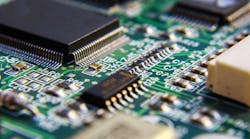PRB Logics Corporation, an independent distributor of obsolete components and excess inventory, is a minnow in the electronics supply chain. But the owner of the company, which is based in Costa Mesa, California, has been charged for perpetuating a big problem.
Rogelio Vasquez, also known as his alias James Harrison, was recently arrested and charged with bootlegging counterfeit chips, some of the which could have been used in military applications, federal customs officials said. His company allegedly sold the components as new parts manufactured by Intel, Analog Devices and Xilinx.
The U.S. Immigration and Customs Enforcement, which led the investigation, said Vasquez resold used and outdated chips that Chinese companies had repainted and remarked with counterfeit logos. Vasquez also falsified test results that would have identified the chips as fakes, ICE said in a statement.
Independent distributors, such as PRB Logics Corporation, are the gap-fillers of the electronics market, selling parts not readily available from authorized distributors, including chips that have been taken out of production but are still needed to repair medical devices or factory equipment with long lifespans. They also track down components on allocation and with long lead times.
PRB Logics Corporation is one of the smaller companies in its class. The largest independent distributors earn hundreds of millions of dollars per year and have been pulling in more revenue as recent shortages of interconnects, passive components and semiconductors have lengthened lead times and suppliers have shrunk from boosting production. And many have ways of ensuring that none of their products are fakes.
But counterfeits often sneak into the supply chain through independent distributors that fail to screen them for authenticity. Several years ago, industry analysts estimated that counterfeit chips represent $169 billion in potential risk per year for the global electronics supply chain. The counterfeit threat is serious enough that the United States introduced a bill last year to stem the flow of electronic waste to other countries where the chips inside could be extracted, repackaged and sold as genuine.
The seriousness of the problem is also reflected in the charges against Vasquez, who was indicted in U.S. District Court in Santa Ana, California, on nine counts of wire fraud, each of which carries a maximum penalty of 20 years in federal prison. He was also charged on 20 counts of trafficking in counterfeit goods, each of which carries a maximum sentence of 10 years.
Lisa Feldman, assistant attorney general for Cyber and Intellectual Property Crimes, is prosecuting the criminal case, which alleges that Vasquez gave instructions to have the date codes, lot codes and countries of origin of the chips altered to fool customers into thinking they were new. It not clear precisely how many fakes his company sold, nor is it clear where the chips ultimately ended up.
Vasquez also allegedly asked a testing laboratory in China to provide two versions of its report. The first version was an accurate accounting of the performance of the counterfeit chips. But the other version was “sanitized” and did not include any visual inspection or other marking tests. These tests would have revealed that the chips were used and remarked, ICE said.
Vasquez was also charged with trafficking counterfeit military goods, since the chips he counterfeited could be used in things like missile defense systems and satellites. Using salvaged, substandard or incorrect components can increase the risk that these systems will fail, and that could lead to classified information being leaked or military operations being interrupted, ICE said.
The chips, known as field programmable gate arrays (FPGAs), are primarily sold by Intel and Xilinx. FPGAs can be configured by customers after manufacturing, withstand radiation and high temperatures, and can cost tens of thousands of dollars on the high end. The indictment says that Vasquez sold eight components that he disguised as Xilinx chips.
The charge for dealing in counterfeit military goods carries another 20 years maximum sentence in federal prison, ICE said.
